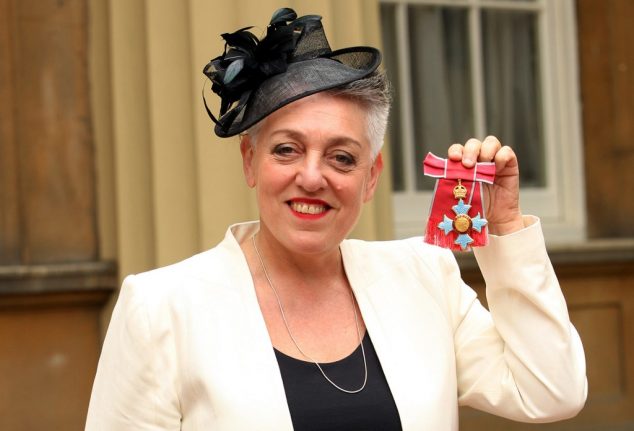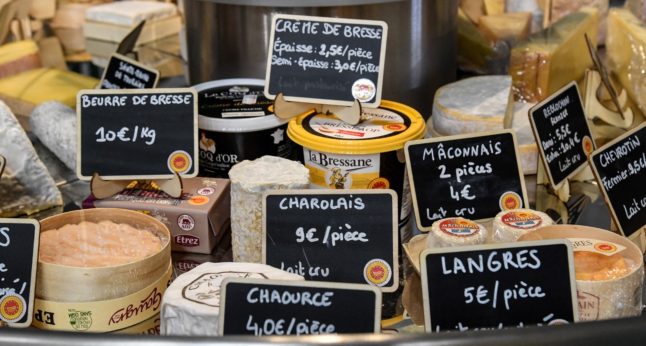Among the first shows she put on at the 157-year-old Théâtre du Châtelet was a rap reworking of Camus, she wants to change the French theatrical training system, invite the people of Paris – and its poorer suburbs – take have ownership of the theatre and she's passionate about improving diversity within the sometimes staid world of French theatre.
The 62-year-old Londoner is starting as she means to go on with her first season at the newly-reopened theatre and she has big plans for the future.
She told The Local, at an event organised by the Anglo American Press Association: “We want the people who live in Paris – and the banlieues – to feel that this is their theatre. They help fund it (via Paris City Hall grants) but I think at the moment they don't feel it is theirs and I want it to represent better the great diversity of Paris.”
To that end she has been involving the people of Paris in a major consultation exercise which she will use to create targets – “because I'm English so I believe in real targets” – for the next 10 years.
READ ALSO Eight of the best things to do in Paris this December

Ruth Mackenzie and Thomas Lauriot dit Prévost. Photo: AFP
Although she was first appointed in 2017 – after going through four panel interviews in French with her French fellow director Thomas Lauriot dit Prévost – the theatre has been closed for major refurbishment ever since, and only reopened this summer.
Among her first productions was a reworking of Les Justes by French literary giant Albert Camus – but given a rap makeover.
She said: “It was directed by Abd al Malik and he went out into the suburb of Aulnay-sous-Bois to do workshops with young people there in order to create the rap, and a group of those people from the workshops were part of the production on the stage.
“We believe that this is the first time a black director has worked at Châtelet – in 2019, something that would be unthinkable in New York or London but seems to be normal in Paris.
“And when the show was on a lot of the people from Aulnay-sous-Bois who had been in the workshops or were friends with those on the stage came to see it, using the €10 young people's tickets. And for a lot of those young black people from the banlieues it was the first time they had been to Châtelet theatre, but I hope they are starting to think of it as their theatre.”
Among other things lined up are a new piece created by an African singer and activist and a combined electro music and ballet, as well as more straightforward commercial fare like the revival of An American in Paris, which opens on Friday, November 28th.
Châtelet has a great tradition of musical theatre and dance, stretching right back to Serge de Diaghilev and the Ballet Russe, something Ruth is keen to honour.
She said: “We will continue to commission and perform musicals, both in English and French, and I think they remain popular because they have beautiful text and beautiful music.”

The Théâtre du Châtelet, founded in 1862 has recently undergone a major renovation. Photo: AFP
But she also a plan to increase the number of French actors getting involved in musicals, with a specialist training course on offer.
She said: “French training is very linear so you either specialise in singing or acting or dance so what we were seeing was that when we auditioned for musicals there were not enough French performers who had all three skills to the level needed.”
Ruth has committed to publishing the comparative salaries at the theatre every year until the gender pay gap is eliminated. At present the gap between male and female wages is 3.7 percent – set against the French average of 24 percent.
She has also hosted a panel discussion with the New York Times about the #MeToo movement and has a warning for the French arts scene.
She said: “In France there has not been a big scandal in the performing arts world in the same way that the Harvey Weinstein scandal broke in America. But that doesn't mean that there is no scandal, in any place where there is an imbalance of power there is the potential for abuse.
“In the Weinstein case what was so striking was that everybody knew hat was going on. It means that we all have a responsibility to do something – to be brave or to support others who are being brave.”
And of course, being British, we had to ask her about Brexit.
“I'm sure Brexit will in the future be seen as an episode of self harm and self deception on a Shakespearean scale and all I can say is I'm so thankful I now live in Paris.”



 Please whitelist us to continue reading.
Please whitelist us to continue reading.
Member comments